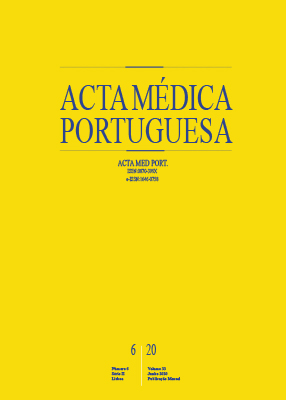Perfectionism, Burnout and Extracurricular Activities Among Medical Students from the University of Coimbra
DOI:
https://doi.org/10.20344/amp.12083Keywords:
Burnout, Professional, Leisure Activities, Perfectionism, Portugal, Students, Medical, Stress, Psychological, Surveys and QuestionnairesAbstract
Introduction: The participation in extracurricular activities reduces the attributed importance to some causes of perfectionism, which influences the prevalence of burnout in medical students. This study aimed to investigate how this relationship occurs and which factors it is dependent on, in order to create strategies directed at these potential targets.
Material and Methods: We developed a questionnaire that assesses the participation in extracurricular activities, including a survey regarding the reasons for perfectionism and part of the Copenhagen Burnout Inventory adapted for students. The questionnaire’s application to medical students of the Masters Degree in Medicine of the Faculty of Medicine, University of Coimbra was followed by statistical analysis.
Results: In a sample of 360 students, 40% ranked highly in personal burnout, and 28.1% in study-related burnout, while 22.2% showed high levels of burnout in both components. Students who participated in extracurricular activities were less frequently associated with simultaneous personal-related and study-related high levels of burnout (p = 0.013). The kind of chosen extracurricular activity was not
associated with the prevalence of burnout.
Discussion: Only 53.9% of students participate in extracurricular activities. Such participation is associated with a lower prevalence of burnout if it is practiced several times per week. The choice of one kind of activity over another does not seem to influence the prevalence of this syndrome, all of which are associated with benefits in different domains.
Conclusion: We observed a lower prevalence of burnout among students that engaged in extracurricular activities. Further studiesthat can infer causality in this relationship are needed, in order to establish effective solutions specific to the medical course context.
Downloads
Downloads
Published
How to Cite
Issue
Section
License
All the articles published in the AMP are open access and comply with the requirements of funding agencies or academic institutions. The AMP is governed by the terms of the Creative Commons ‘Attribution – Non-Commercial Use - (CC-BY-NC)’ license, regarding the use by third parties.
It is the author’s responsibility to obtain approval for the reproduction of figures, tables, etc. from other publications.
Upon acceptance of an article for publication, the authors will be asked to complete the ICMJE “Copyright Liability and Copyright Sharing Statement “(http://www.actamedicaportuguesa.com/info/AMP-NormasPublicacao.pdf) and the “Declaration of Potential Conflicts of Interest” (http:// www.icmje.org/conflicts-of-interest). An e-mail will be sent to the corresponding author to acknowledge receipt of the manuscript.
After publication, the authors are authorised to make their articles available in repositories of their institutions of origin, as long as they always mention where they were published and according to the Creative Commons license.









